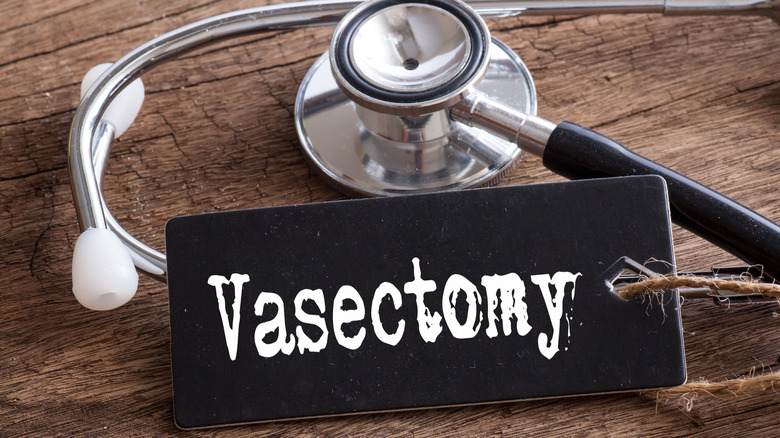What You Need To Know If You're Considering A Vasectomy, According To Urologist Justin Houman - Exclusive
Each year, over 500,000 men across the country opt to undergo a vasectomy procedure, reports the Cleveland Clinic. Yet many misconceptions remain around how a vasectomy affects both the body and one's reproductive health.
"Vasectomies are a form of male birth control that cuts the vas deferens, which carries sperm to your semen," explains Justin Houman, MD, Director of Men's Health at Tower Urology at Cedars-Sinai Medical Center, in an exclusive interview with Health Digest. "It is generally performed in the office under local anesthesia. Vasectomies have a low risk of problems and are very common." When carried out by a skilled urologist, Dr. Houman explains that complications following a vasectomy are rare. "If performed by an experienced physician, success rates are as close to 100% as you can get," he states.
Dr. Houman goes on to emphasize that any side effects experienced after the procedure are generally mild and the recovery period is usually brief. "Very rarely, some patients experience lingering pain after a vasectomy," he says. "Most men have a vasectomy performed on a Thursday or Friday, recover over the weekend, and are usually ready to get back into their normal day to day life on Monday."
What are the most common myths associated with vasectomies?
Of the many myths surrounding vasectomies, Dr. Houman explains one of the most common misconceptions is that the procedure will reduce the quality of the patient's sex life. Dr. Houman addresses this concern, stating, "Sex will be just as good after a vasectomy — or better! The freedom from worry about unplanned pregnancies will allow you to be more spontaneous and will probably allow you to enjoy it more."
Additionally, Dr. Houman states that many people believe vasectomies will produce hormonal changes within the body. "The second myth is that testosterone levels will decrease. While it's true that the testicle makes both sperm and testosterone, the difference is, the testicle makes testosterone and transports it through the bloodstream, not the vas deferens. Testosterone levels don't go down as a result of vasectomy."
The third most common myth Dr. Houman has encountered in his line of work is that a vasectomy will cause erectile or ejaculation dysfunction. "If you could ejaculate before your vasectomy, you'll ejaculate after your vasectomy," he says. "Ejaculatory fluid, semen, is made in the prostate and the seminal vesicles, which are not cut during a vasectomy ... The muscle contractions that force fluid out during ejaculation come from the pelvis and, again, are not affected by vasectomy."
Other myths to stop believing about vasectomies
"Another myth is that a vasectomy shuts down sperm production. But actually, a vasectomy just blocks sperm production. Men continue to make sperm, it just has nowhere to go," Dr. Houman clarifies. He goes on to explain how it's this same cycle that makes vasectomy reversal possible. "Sperm typically live about 3-5 days and then peter out. Therefore, if a guy doesn't ejaculate every 5 days or so, his sperm die anyway—only to be replaced by millions more. After a vasectomy, the same thing happens; sperm are always in a constant state of production and decay, regardless of whether they have anywhere to go. This explains why vasectomy reversal works!"
Lastly, Dr. Houman shares that the final most common myth he hears related to vasectomies is that they can increase one's risk for prostate cancer. He explains how this belief gained traction in the 1990s and again in 2014 when two studies suggested a link between vasectomies and prostate cancer. "Both times, the studies faced criticism for problems with their design and methodology," he points out. Dispelling this myth altogether, Dr. Houman concludes, "The flawed studies sparked larger, better designed studies, and these studies showed no connection between vasectomy and prostate cancer. The American Urological Association reviewed all the data and weighed in to say that vasectomy does NOT cause prostate cancer."
To connect with Dr. Houman, you can find him on Instagram: @Justin.Houman.MD, Twitter: @JustinHoumanMD, YouTube: https://www.youtube.com/jhouman, TikTok: @justin.houman.md, Facebook: https://www.facebook.com/LAMensHealth/, or his Website: https://houmanmd.com/ or https://www.towerurology.com/our-physicians/justin-houman-md/


